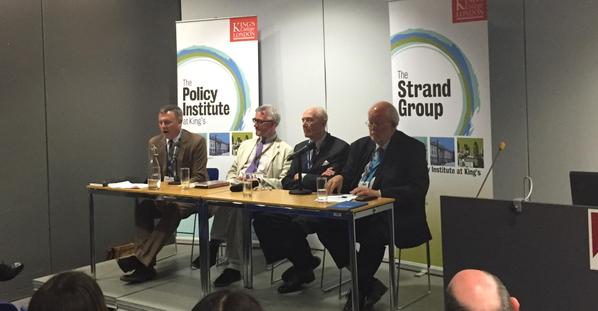‘I’ve got a typewriter and a bottle of gin’: Sir Richard ‘Otto’ Clarke, titan of the Civil Service
The Strand Group looked back at the career of one of the great civil servants of the middle three decades of the 20th century


Your support helps us to tell the story
From reproductive rights to climate change to Big Tech, The Independent is on the ground when the story is developing. Whether it's investigating the financials of Elon Musk's pro-Trump PAC or producing our latest documentary, 'The A Word', which shines a light on the American women fighting for reproductive rights, we know how important it is to parse out the facts from the messaging.
At such a critical moment in US history, we need reporters on the ground. Your donation allows us to keep sending journalists to speak to both sides of the story.
The Independent is trusted by Americans across the entire political spectrum. And unlike many other quality news outlets, we choose not to lock Americans out of our reporting and analysis with paywalls. We believe quality journalism should be available to everyone, paid for by those who can afford it.
Your support makes all the difference.I went to the Strand Group at the Treasury on Monday to hear Jon Davis, Sir Nick Macpherson, Sir Douglas Wass and Charles Clarke (pictured above) talk about Charles’s father.
Otto Clarke was an extraordinary person. Dr Davis, director of the Strand Group at King’s College, London, reminded us that, before he joined the government service on the outbreak of war in 1939, Clarke had been the original Lex on the Financial News, before it merged with the Financial Times, and that he had devised the Ordinary Share Index.
Sir Douglas, who was Treasury Permanent Secretary 1974-83, recalled first meeting him in 1948, when Clarke was chairman of the Programmes Committee, which met every day and was responsible for central planning. One Friday he closed the meeting saying, “No meeting on Monday because the chairman and the secretary are getting married.”
After the war Clarke joined the Treasury, becoming Second Permanent Secretary 1962-66, before going as Permanent Secretary to Aviation and then Technology, where his minister was Tony Benn, before retiring in 1971.
Wass recalled an occasion when Clarke disagreed with a Treasury paper for the Cabinet on education funding and, leaving the office at 5pm as usual, arrived the following morning, with his own brilliantly written and detailed five-page document for Cabinet. Wass asked him how on earth he had managed to do it overnight. “I’ve got a typewriter and a bottle of gin.”
Clarke was most unusual in the senior civil service in typing some of his own memos, a skill he had learned as a journalist that must have given him some advantage over his peers.
Charles commented that his father had typed a lot of his papers himself. When he died in 1975, his mother found boxes of them in the attic, and “the Cabinet Secretary went into a state of mild concern”.
Sir Nick Macpherson, the current Permanent Secretary of the Treasury, said delphically that the issue of who types what continues to this day.
Wass said that Otto Clarke was “a character you either loved and hated or hated”, although he contradicted himself by saying, “I loved him.” He said that Clarke held most ministers and colleagues, apart from Leo Pliatzky, one of his successors as Second Permanent Secretary at the Treasury, “in high disesteem”.
Charles disagreed, saying that his father had, for example, a high opinion of Tony Benn, although they had a difficult relationship because Benn was disloyal to the Prime Minister, Harold Wilson. As a former Cabinet minister himself, Charles said that a permanent secretary’s loyalty must ultimately be to the Prime Minister rather than a departmental minister.
Charles admitted that he himself did not have a high opinion of Benn, but that he was a “better quality of man” than Jeremy Corbyn.
The event was attended by two of Charles’s brothers and three of Otto’s grandchildren. One brother, Tim, wanted to know if his father had ever been beaten in debate: he had had so much conviction that he was right, that he was always like a bulldozer to the end. Wass said he disagreed with Clarke over his proposal, not adopted, to float the pound on the foreign exchange market in 1952, but that he had never seen Clarke bettered in argument.
The other brother, Mark, asked why his father had been nicknamed Otto. Mark’s theory was that it reflected his forceful personality, associated in the 1930s with a Germanic style. Dr Davis said that, according to Sam Brittan, the Financial Times journalist, it was because his round glasses and the bridge over the nose looked like OTTO.
There are some mysteries that history may never solve.
Join our commenting forum
Join thought-provoking conversations, follow other Independent readers and see their replies
Comments